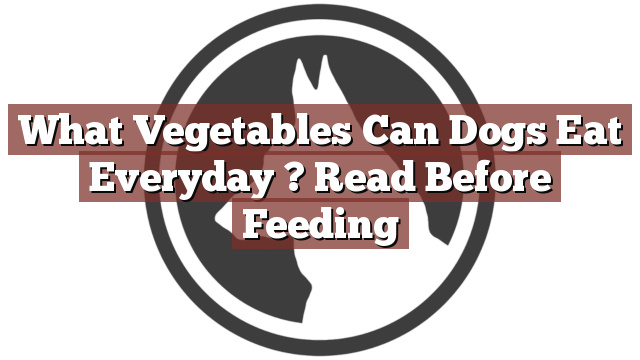Understanding Your Dog’s Dietary Needs
As a responsible pet owner, it is essential to understand your dog’s dietary needs to ensure their overall health and well-being. While dogs are primarily carnivores, they can benefit from incorporating certain vegetables into their diet. However, it is crucial to be well-informed about which vegetables are safe for dogs to consume on a regular basis.
What Vegetables Can Dogs Eat Everyday? Read Before Feeding
Can dogs eat vegetables? The answer is yes! Dogs can consume a variety of vegetables that are not only safe but can also provide essential nutrients. Some of the vegetables that are safe for dogs to eat every day include carrots, green beans, broccoli, and sweet potatoes. These vegetables are packed with vitamins, minerals, and fiber, which can contribute to your furry friend’s overall health.
Pros and Cons of Feeding Vegetables to Dogs
Feeding vegetables to dogs can have several benefits. As mentioned earlier, vegetables are rich in various nutrients that can support your dog’s immune system, promote a healthy coat, and aid in digestion. Additionally, incorporating vegetables into your dog’s diet can help with weight management as these low-calorie options can provide a sense of fullness without adding excessive calories.
However, it is essential to consider a few factors before feeding vegetables to your dog. Some vegetables, such as onions, garlic, and tomatoes, can be toxic to dogs and should be strictly avoided. Furthermore, while vegetables are a great addition to a dog’s diet, they should not replace their primary source of nutrition, which should come from high-quality, balanced dog food.
Conclusion: Providing a Balanced and Nutritious Diet for Your Canine Companion
In conclusion, it is safe for dogs to eat certain vegetables every day, as long as they are non-toxic and appropriate for their digestive system. Vegetables like carrots, green beans, broccoli, and sweet potatoes can be excellent choices to incorporate into your dog’s diet, providing them with essential nutrients. However, it is crucial to consult with your veterinarian before introducing any new food to your dog’s diet.
Remember, a balanced and nutritious diet is vital for your canine companion’s overall health. While vegetables can be a healthy addition, they should never replace the main source of nutrition, which should be high-quality dog food. By understanding your dog’s dietary needs and making informed choices, you can ensure that they receive the best nutrition possible and lead a happy and healthy life.
Thank you for taking the time to read through our exploration of [page_title]. As every dog lover knows, our furry friends have unique dietary needs and responses, often varying from one canine to another. This is why it's paramount to approach any changes in their diet with caution and knowledge.
Before introducing any new treats or making alterations to your dog's diet based on our insights, it's crucial to consult with a veterinarian about [page_title]. Their expertise ensures that the choices you make are well-suited to your particular pet's health and well-being.
Even seemingly harmless foods can sometimes lead to allergic reactions or digestive issues, which is why monitoring your dog after introducing any new food item is essential.
The content provided here on [page_title] is crafted with care, thorough research, and a genuine love for dogs. Nevertheless, it serves as a general guideline and should not be considered a substitute for professional veterinary advice.
Always prioritize the expert insights of your veterinarian, and remember that the health and happiness of your furry companion come first.
May your journey with your pet continue to be filled with joy, love, and safe culinary adventures. Happy reading, and even happier snacking for your canine friend!

